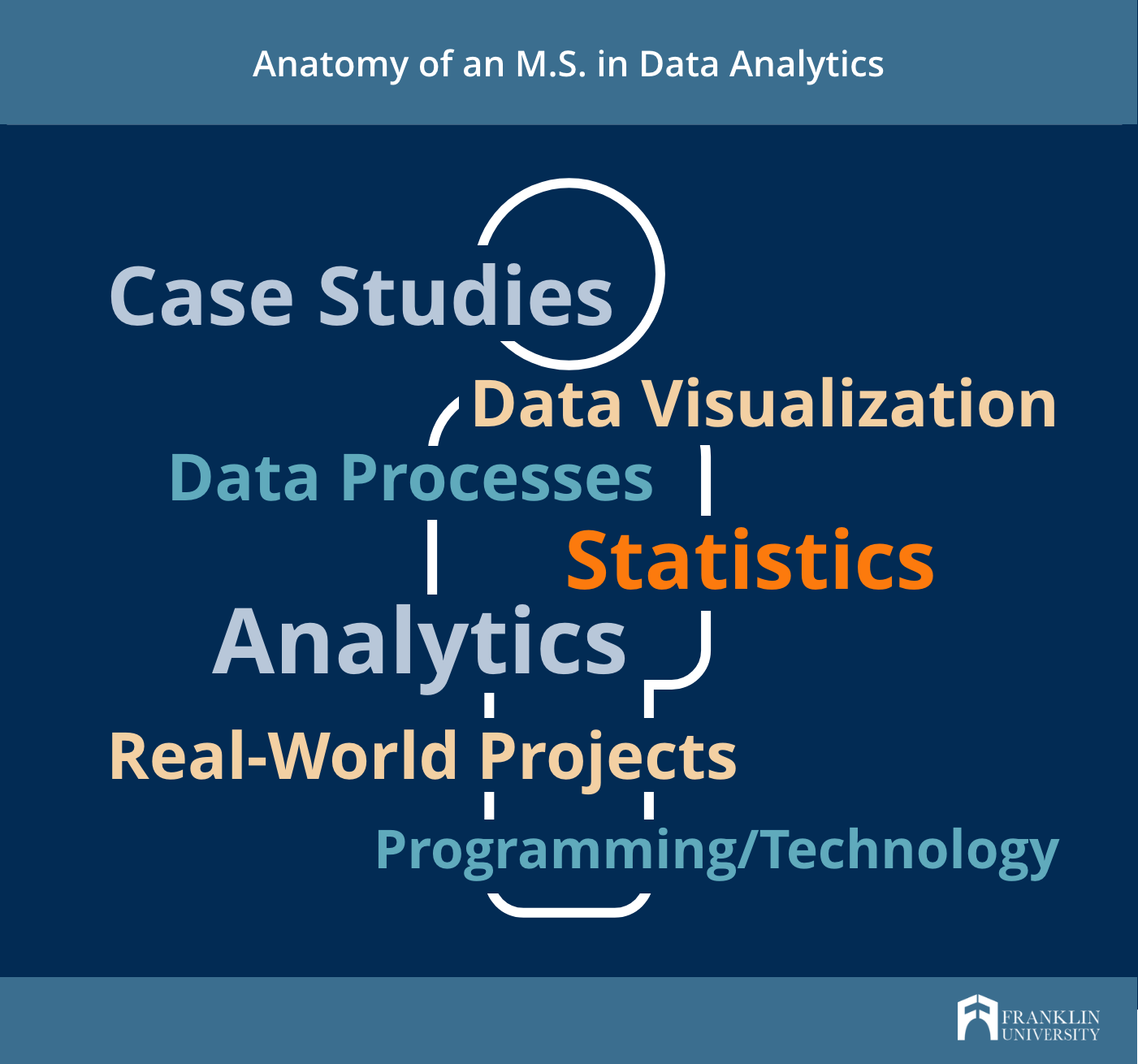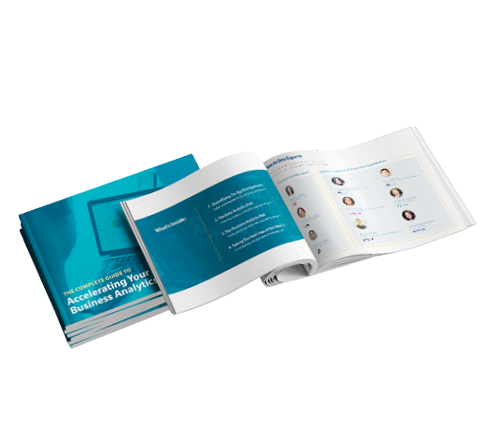Request Information
We're Sorry
There was an unexpected error with the form (your web browser was unable to retrieve some required data from our servers). This kind of error may occur if you have temporarily lost your internet connection. If you're able to verify that your internet connection is stable and the error persists, the Franklin University Help Desk is available to assist you at helpdesk@franklin.edu, 614.947.6682 (local), or 1.866.435.7006 (toll free).
Just a moment while we process your submission.

What is a Data Analytics Master’s Degree? 5 Big Questions Answered
Most people wonder if they really need a master’s degree to get ahead—and rightfully so. A master’s degree is a big investment of time, money and energy. It’s a decision that shouldn’t be made lightly. However, it’s also one of the most influential decisions you’ll make if you want to advance your career.
In many professions, a bachelor’s degree may be enough to get your foot in the door for an entry-level position but it no longer sets you apart. If a bachelor’s degree remains your highest level of education, you may find yourself struggling to advance to management and executive levels.
That’s especially true in a fast- growing career like data analytics. With a master’s degree, you can differentiate yourself with the essential skills to succeed.
1. What Do You Typically Study in a Data Analytics Master’s Program?

“It's important to be well-versed in multiple software or languages.
Take care to build a good software and language repertoire and not
just upskill in only one,”
says Angela Fullenkamp an Analytical Training Consultant at SAS.
While there are different nuances to every data analytics master’s program, there are core competencies that are studied by every student. These include:
- Data Handling: Data is only good if it is credible, which is why it’s important to learn best practices for data collection, data cleansing and data warehousing. With this knowledge you will have a holistic understanding of the information in front of you.
- Mathematics: Building a strong understanding of the theory and practice of statistical skills to conduct descriptive and predictive analytics. The ability to apply appropriate data analytics methods helps you to solve real-world business challenges.
- Technology: Sharpening your technical skills to analyze information in order to produce analytically driven inferences and insights that can be used to generate actionable recommendations.
- Analysis: Analytical skills include understanding how to write technically proficient, quantitative surveys across a wide array of topic areas and with varying degrees of complexity.
- Visualization: Visualization and communication skills are necessary to effectively convey findings and provide strategies and best practices within your organization. These skills are often coupled with communication expertise so you can effectively convey findings and provide strategies and best practices within your organization.
Get a FREE roadmap that includes insider information to help you maximize the many opportunities in the fast-growing field of Big Data.
2. What Career Skills Do You Learn in a Data Analytics Master’s Program?
On graduation day, you should not only be leaving your university with a diploma, you should be walking out with distinct, marketable skills you can call on to succeed in your career including the ability to:
- Present data and translate insights for a non-technical audience in compelling ways to inform business decisions.
- Conduct benchmarking trends and market analysis that are influential to the business.
- Understand what data models to apply to specific problems – and how to source that data.
- Manage large unstructured data sets and turn them into organized and usable data.
- Use machine learning to automatically detect patterns and trends in the data, expediting the process of harnessing meaningful insights.
3. Is a Master’s in Data Analytics a Good Degree?
Every industry is being transformed by the power of data. Whether an organization is looking to improve profitability, gain new customers, better serve their constituencies or get an edge over their competition—they turn to highly skilled data analytics professionals for the solution.
If you want to compete for top-paying positions at competitive companies, a master’s degree is becoming the gold standard.
According to a Burtch Works study, 50% or more of data scientists and predictive analytics professionals hold master’s degrees. Many of these professionals also hold advanced degrees in statistics, business or engineering. With the rise of dedicated data analytics degrees at the master’s level, you have the opportunity to combine the most beneficial aspects of these areas of study into one specialized degree.
It’s proven there is a correlation between level of education and earnings. According to Lightcast™, the average posted salary for a data scientist is $120,200. The value of a master’s degree shouldn’t be measured solely in monetary terms. However, for most professionals, increasing their earning potential is one of the primary reasons for pursuing a master’s degree.
4. How Long Does It Take To Earn A Master’s in Data Analytics?
Getting a master’s degree in data analytics is more accessible than ever, but it can still be a process. That’s because on average it can take one-to-three years for a student to complete a graduate program. And that doesn’t take into account all of their life commitments. But at Franklin University, in just 19 months a student can earn an M.S. in Data Analytics. And with all courses available online, it’s easy to find a work-life balance as you advance your knowledge base.
5. Who Should Pursue a Master’s Degree in Data Analytics?
A master’s degree in data analytics is ideal for individuals who want to go deep in a data analysis field. It’s helpful for people who like the thrill of discovering, who enjoy finding answers to questions not yet asked, and who want to move beyond data cataloging and categorizing. It’s also a valuable “tool” for those who want career flexibility (the ability to move between industries throughout their career.)
“If you’re confident that you’ll eventually want to move into a higher-level or management position in data analytics, obtaining a master's degree in data science or data analytics is nearly always required,” says Nimet Alpay, Ph.D., program chair, M.S. in Data Analytics at Franklin University.
A master’s degree in data analytics will enable you to:
- Advance in your career
- Increase your salary potential
- Begin your next “work chapter” by becoming a consultant
- Grow your skill set
- Stay current (and relevant)
- Build credibility as an industry expert
Find The Right Master’s Degree in Data Analytics
To stay competitive in this field, a master’s degree is essential. But you can’t upset your current career while collecting the tools to build a new one.
Franklin University’s flexible, online data analytics program is designed for working adults. The M.S. in Data Analytics at Franklin combines best-practice methodologies with hands-on learning and instruction from industry professionals to get you career-ready in as few as 19 months.
If you’re a working professional who is looking to advance or change your career, you need a university tailored to your unique needs. Explore how the M.S. in Data Analytics degree at Franklin can take your career to the next level and help you advance in the exciting field of data analytics.





